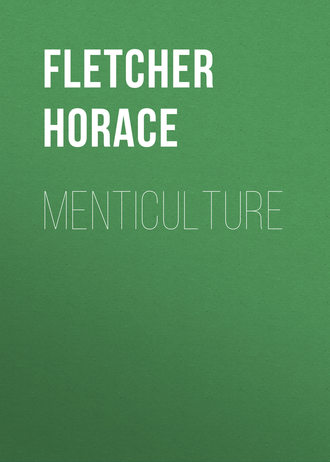 полная версия
полная версияMenticulture
In suggesting the possibility of a Social Paradise or Community Heaven, it is presupposed that education along the lines of both intellectual and manual training will have become universal, and that every one shall render service to his fellows according to his strength; also that idleness, when one should work, and deception in trade, will have come to be classed as crimes, and not as evidences of "shrewdness."
Thirty years of TravelIt has been my good fortune to travel to and fro over the earth's surface for thirty years, years of experience passed among the people of many different nations. I have made quick comparisons of the habits and customs of them all; and I have observed how easily some do things that others perform clumsily. The standard measure of my comparison has always been Japan. I could not help observing there less crime, better appreciation of art and nature, more physical dexterity and skill, fewer notes out of harmony, and more general happiness, gentleness, and consideration for fellows and animals; less (almost no) religious or sectional prejudice; a universal patriotism and respect for authority (as good children are respectful of the authority of beloved parents); a love of life, but no fear of death; and many other qualities that have commanded the respect of the world under the bright light of recent events.
Brave Little JapanBrave, gentle, artistic, lovable little Japan, which, thirty odd years ago, was nursing in quiet seclusion a beautiful flower of artistic civilization, has been rudely but providentially forced into the community of nations to teach the rest of the world a great lesson in the art of true living. By the exercise of judicious but resistless courage she has laid the Oriental Colossus who attacked her at her feet; and if the bulldog and buzzard nations of the West, do not unite their forces to obstruct her inclination, she will lift her fallen foe from a condition of slavery to barbarous aliens to a condition of tranquillity and happiness. She will do this through the introduction of reforms in government and administration which she has gathered from the best experience of all the world. What a missionary Japan is! A missionary of the art of true living. A missionary of harmony. The
contact of Japan with the other nations made the World's Congress of Religions possible; and what this means to the advancement of man on the road to harmony and happiness, was recently stated by Prof. Max Muller, when he prophesied that this event would come to be appreciated as the greatest civilizing influence of the Nineteenth century.
World's Congress of ReligionsExtremes Brought TogetherMay the example of Japan set the boors of the world to thinking, cause them to take their fore feet out of the trough, look up to the sun and the light of dawning civilization, accept the simple teachings of Christ and Buddha and common sense, and start a Heaven here on earth. Steam and electricity have brought the extremes of our earth together; the telescope has let us into the secrets of the neighboring worlds, and logic and common sense may find in the possibility of Emancipation a means of bringing Heaven to us in this life.
A DISCUSSION
WHICH FOLLOWED THE READING OF THE FOREGOING PAPER
"Can anger and worry be entirely eliminated from the human mind?"
"Yes; they are simply bad habits of the mind, parasites, unnatural, and therefore uncivilized conditions, nursed by false ideas of pride or necessity; and their elimination is a purely mental process within the control of every intelligent person who has sufficient self-respect to recognize within himself the reflection of the Divine Image."
"In what does the germ cure of mental ills differ from the Christian method of repression through answer to prayer?"
Christ Advocated Germ Cure"Christ clearly advocated the germ cure. He did not say 'Try to do unto others as you would have others do unto you,' but 'Do unto others,' etc. 'Be ye perfect as your Father in Heaven is perfect.' In all of his teachings do and be were the commands. Most of the creeds, however, endow man with a weakness which is self-condemning. The prayers are offered perfunctorily, and sometimes without belief in their efficacy, while the passions are nursed privately in full belief that they are essential attributes of fallen man."
"May not the elimination of anger and worry take away some of the stimulation to effort that is necessary to human progress?"
Emancipation not Weakness"Assuredly not. The absence of anger and worry is an evidence of strength and not of weakness. So-called righteous anger is a weakness in the presence of judicial calm. Without anger and worry one is stronger to ward off a blow, administer a correction, or protect a principle. The emancipated mind is as eager for effort as a child is for play. Freed from anger and worry one can shovel more dirt, plough more furrows, perform every duty better, and with less fatigue, than if under their influence."
"Are there examples in every-day life, among every-day people, that prove the possibility of superiority over anger and worry?"
The Strongest Evidence"Yes. Habitually profane men do not swear in the presence of ladies. Vicious men are gentle when among those whom they respect. The passions are subservient to the will under conditions that reverence or fashion prescribe. If they are subservient under any conditions they can be controlled under all conditions. Nothing for instance, could make you angry while we are talking on this subject, because you would feel ashamed to show slavery to a condemned and unmanly weakness."
"If it is possible to get rid of the depressing passions, and they are so unprofitable, why has not mankind become emancipated long before this?"
Why not Always Known"This question can best be answered by asking others. Why were a personal devil and witches and filmy ghosts considered possibilities as late as the beginning of this century? Why was human slavery believed to be a divine institution by the majority of the world's inhabitants as late as fifty years ago? Why are the divine right of kings, and the assumption that the sovereign can do no wrong, possibilities of the present? Why is it possible that a Supreme Court of the United States can be divided on questions of political significance, and the points of difference of opinion be in harmony with the previous political affiliations of the justices? Politics represent the selfish in human contact as at present managed, while justice is supposed to be spotlessly unselfish; yet the former unblushingly invades the sanctuary of the latter, because selfishness is held to be a necessity."
Emancipation not Selfish"Is not the condition of Emancipation selfish? Is it not selfish not to worry for one's friend, even if self-worry is eliminated?"
"Emphatically, no! Emancipation puts one in a condition to be unselfish. Suppose his friend need aid or sympathy; will worry furnish either? With the extirpation of the depressing passions comes the strength, and the ability, and the desire, to give to others, the aid and sympathy they may be in need of. Actual, or even metaphorical, wringing of hands, is not the sort of sympathy that soothes. It is like the "blind leading the blind," or rather, the weak trying to assist the weak. Better try to help with the strength born of Emancipation than with the weakness of the enervating passions."
"I can easily understand how anger can be classed as a sin, because it is aggressive and affects something outside of us; as a sin, I can see how it ought to be cast out; but as worry deals only with one's self, I do not believe it can be called a sin; then why is it necessary to eliminate it, especially as it may be an incentive to action, to prevent the causes of the worry?"
"This whole question has been answered before in the presentation of the theory, but as it has not carried the force of impression that I intended, I will take it up piecemeal, and try to be more clear.
One's First Duty"In the first place, one's first duty is to one's self in the matter of cultivation and care; this, not on account of egotism or selfishness, but in order to fit him to be strong and useful and a good member of his circle. As a parent, he should make himself the most perfect progenitor and example possible; as a member of Society he should aim to be the most able and useful; and as the custodian of the Divine Essence within him, he should not harbor or encourage weeds of the soul, whether visible to others, or within the secret corners of his own heart.
"As to worry ever being an incentive to wise or good action, I will repeat a section of the theory. 'Worry's prophesies are seldom realized, and if they are, the realization is generally caused by the worry itself.'"
"How can emancipation be secured for the community?"
Woman's Opportunity"Through the influence of the emancipated individual; chiefly through the influence of the emancipated woman. In the crossing of sabers she cannot assist; but in a war against the enemies of the mind, when love is the weapon, she can and will occupy a place in the front rank. She can make anger and worry unfashionable, as she already has made profanity and obscenity unfashionable.
Emancipation Clubs"To accomplish this, let clubs be formed in each community and in each church, and let each church become a club-house as well. Introduce healthful amusements such as make other clubs attractive, and place in large letters over the portal and the altar
GROWTHEMANCIPATIONHELP"You will have then constantly before you the only cure for mental cancers, and the essence of all religions expressed in three words; you will have touched the button of the Divine camera within you whose film is sensitive only to the rays of good. Love and growth will do the rest. The teachers of morality and religion will do abler work under the realization that not only the 'old Adam,' but the Divine Essence as well, have seats in each human soul, and that, when the good is appealed to in terms of confidence and understanding, evil will be cast out instantly, without a lifetime of controversy, and without waiting for eternity, or even for the death-bed to unloose the fetters.
Christian Societies"As a result of organization on the basis of Emancipation, and when it has become an accepted fact that anger and worry are only bad habits of the mind, no clergyman can show them and retain the respect of his congregation; no King's Daughter can entertain them and be worthy of her badge; no member of the Christian Endeavor Society can harbor within himself the arch enemies of Christianity which the Master commanded his disciples to cast out, and be loyal to his cause; and no individual in the pursuit of duty, or even of selfish pleasure, can afford to carry such weighty handicaps and hope to win the race."
PLYMOUTH CHURCH CLUB AND ARMOUR INSTITUTE
Frank W. GunsaulusA good example of a church club is that which forms a part of Plymouth Church in Chicago. Plymouth Club was founded by Dr. Scudder and is warmly encouraged by Dr. Frank W. Gunsaulus, the present pastor of the church. Dr. Gunsaulus is also president of Armour Institute, where manual training is taught side by side with letters and the sciences to men and women alike. In these two eminently practical organizations most of the conditions favorable to growth are already furnished. Add to these Emancipation as the motto of the club, and as the requisite mental accomplishment for admission to the school, and the conditions will be perfected to the highest degree.
The word Emancipation has a very formidable sound because it is associated with a great war; but its attainment through germ eradication is a simple and easy accomplishment.
College Presidents ResponsibleThe presidents of great mental and manual training institutions know that the depressing and dwarfing phantoms of the mind are merely bad habits – weeds that can be rooted out – and that anger and worry are the roots.
They have provided commodious buildings, learned professors, the most perfect chemical and mechanical appliances, and thousands of books, to aid mental and manual culture; and yet, they fail to apply the first principle of all their sciences to the preparation of the pupil. In horticulture they do not tolerate worms or weeds; in chemistry they first examine into the purity of the ingredients; and in mechanics the greatest care is taken to avoid friction. Anger and worry are conditions of extreme mental friction, which, during their presence, stop the progressive action of the mental machine.
It would impose no impossibility, neither would it entail any hardship, to require of students that they should subscribe to the following:
Science teaches, and experience corroborates the fact, that the depressing or evil passions are bad habits of the mind, and not necessary ingredients.
Anger and worry are the roots of the evil passions and can be pulled out.
In order to promote the best possible growth it is required that Emancipation should be the rule of life of the student.
A Rule of LifeUnder the suggestion of the possibility of Emancipation from undesirable mental enemies, emanating from so respected a source as the faculty of a chosen college, the student would acquire the prerequisite condition of "faith"; while the absorbing work of college life, surrounded by fellows working in sympathy with him, would strengthen the faith into a belief; and the immediate recompense of harmony would be evidence of its value as a rule of life.
Emancipation will SpreadFrom the school the student would carry the rule back into the family, and into all walks in life; and with the aid of present means of communication the influence would spread the world over, disarm the prodigious preparations for struggle that are being made, and distribute the palm branch to take the place of the sword.
Will not the great educators whom the world respects so highly, and in whom it has so much faith, try the experiment? The promised fruit is worth the trial.
DIAGNOSIS AND REMEDY
DegenerationIt is believed by many, that Society and Politics, at the present time, are badly diseased. Mr. Max Nordau's diagnosis of them, which he entitled Degeneration, has met with general approval. Legislative (especially municipal) corruption, and the degradation of some of the courts, are open evidence of the fact. Statesmanship and Politics have been divorced, and are already strangers to each other. The marriage of Might and Right, has been sanctioned by popular consent. Power is no longer used as a lever with which to uplift the weak, but has been transformed into a social crushing machine. Caste, ostentation, dissipation, and insincerity, are the established idols that lure the present generation towards greedy ambition.
Ready to BreakIt is also believed, and is perhaps true, that the social ulcers have been so irritated by ostentatious rivalry, and the commercial ulcers are so distended with the pus of ruinous competition and corruption, that they must soon come to a head, and that convalescence and cure may be possibilities of the future.
While these symptoms of disease are visible to all, and are tolerated as necessary evils, they fortunately do not cover the whole body politic; but yet, they seriously disfigure its face, and grievously affect the healthy action of its heart.
In the political world, many agents are actively at work to effect cure of the evils which flaunt unblushing in the face of the public. The Committee of Seventy in New York, The Civic Federation in Chicago, and the National Municipal Reform League of the United States, are all doing good temporary work, but they do not reach the root causes of the evils they aim to correct; and it is doubtful if the reforms they accomplish will be any more permanent than were those of their equally zealous predecessors.
Slow Repression FutileIn the moral and religious world, much the same futile methods of cure through repression are in use that obtained during the Dark Middle Ages.
In the individual, phantoms of the imagination, whose presence impose stagnation and disease, are created and clothed with the authority of masters, under the belief that they are the curses which bind fallen men to earth; and this in contradiction of every assurance and promise of Christ; in opposition to all intelligent methods of culture used in connection with animals and plants; and contrary to common sense.
These are strong statements, but they are indisputable; and if they are true, what then, is the remedy?
As previously stated, the only cure is the germ cure; and, beginning with the individual.
Task not DifficultThe task is not a difficult one. Appreciation of the limitations of the power of the depressing passions, and one's strength to extirpate them, and to be superior to them, are the only necessary prerequisites to victory. There is no tedious discipline, as in the various methods of repression in vogue; and dividends are immediately and continuously collectable on the fair face of the investment. No rule of conduct is necessary; for, out of Emancipation, only good conduct, to fit environing circumstances, can be expected; and yet, every Christian, every Jew, every Buddhist, every Mohammetan, every Free Mason, and every Odd Fellow, can accept Emancipation as a rule of life, without renouncing his other faiths and affiliations, because it is the fundamental principle of them all, expressed in terms of present knowledge, and unclouded by the shadows of ignorance and superstition, which gave the name of Dark Ages to a period of our history.
Skeptics InterestedAnd outside of these devotees, there is the great mass of men, the so-called Skeptics, who claim to adhere to logic, and scientific sense, for their light on spiritual, as well as on material subjects. To these, Emancipation will be a haven of repose for their spiritual yearnings; and, unimpeded growth, under Divinely natural conditions, "will do the rest" for them all.
PRESCRIPTION
A Simple RemedyOne grain of the assurance of Christ that man is made in the image of God.
One grain of respect for the responsibility of the care and culture of the Divine Essence with which we have been entrusted.
One grain of the command of Christ (implying a possibility) "Be ye perfect, as your Father in Heaven is perfect."
One grain of the example of Buddha that man can grow to perfection through the elimination of anger and worry and their brood of dependent passions.
One grain of the wisdom of Aristotle which declared that the passions are habits of the mind, and can be gotten rid of as physical habits are gotten rid of.
One grain of the assurance of Omar Khayyam that Heaven and Hell are within ourselves.
One grain of the assurance of Christ that "the Kingdom of Heaven is at hand."
One grain of common sense applied to an analysis of mental handicaps and the discovery of their limitations.
One grain of the to-day experience of the author that anger and worry are the roots of all the passions which depress, and can be eliminated.
DIRECTIONSTake: and then let
The Ever-full Never-fullThe ever-full, never-full bounty of love,Sing a song, tell a tale, strike a chord, from above,Soften strife out of life, find a pleasure in giving,Sound the key-note on earth, of the Art of True Living.SCRAPS OF EVIDENCE
Evidence SoughtEarly in life I was fortunate enough to acquire the belief that, what seemed to be the consensus of opinion of the learned in any art or science, ought to be true; and, accepting their dictum, I have tried to grow up to an appreciation of their intelligence or taste in the subjects of their study, without combatting it with my own callow impressions. In this way I have enjoyed an early appreciation of the classics in music and in art, much in advance of the ordinary experience derived from personal contact. In this spirit of investigation I have collected some scraps of evidence which all prove my theory. No one has denied the possibility of Emancipation, but every one has found a pleasure at once in the ray of hope it suggests.
Since my attention has been directed to the possible total emancipation from the depressing passions, I have taken occasion to interview every man who seemed to enjoy unclouded happiness, as to the secret of his happiness. In almost every instance I have learned that the emancipated condition has dated, not from infancy and inheritance, but from some incident in later life that exposed the passions to ridicule, or showed them to be a cause of danger; such as death as the result of worry, or crime as the result of anger; some object lesson which proved the danger of permitting the passions to absorb one. I enquired of
A PHYSICIANA Physicianwho has recently been selected by vote of the members of his profession to a position of honor among them, and who is conspicuous for his enjoyment of such healthful recreation as only much younger men usually enjoy, whether he did not consider anger and worry habits of the mind, and not as necessary ingredients. "Certainly," said he, "and I know it to be true by the best possible evidence, the evidence of experience." After some further questioning I was able to get from him the following story: "When I was a boy I had an ungovernable temper which brought from my neighbors the prediction that I would come to some bad end.
Possessed of DevilsAt school I was known as one of the four or five 'roosters.' There was scarcely a day that a ring was not formed, and some of us 'roosters' did not engage in a fight. I followed my studies pretty closely, however, in pursuance of a natural inclination to be 'on top,' but without any laudable ambition in connection with them, and finally graduated in medicine and began practice. I suffered great annoyance from horses and servants, and quarreled with them constantly, and got mad at my patients if they showed any unreasonable tendencies; until one day it came to me as a sudden revelation, that, what most hindered them from getting well, was the very thing that possessed me the greater part of the time, and made me disagreeable to myself and others; and I resolved to master myself as I had tried to master others. From that time I date my success in life, and certainly my happiness. I will not allow anything to worry me. If a driver or other servant does not please me, I do not quarrel with him, but pay him off, and let him go with the best of feeling. I have a collector who is very faithful, and very candid at the same time. When he fails to collect an account that is due, I sometimes ask him the reason, and he repeats to me what my patient has said. One day I questioned him about an account that had been long overdue, against a patient whom I met cordially every day at the club, but who was evidently 'short' at the time and suffered annoyance from collectors. 'What did he say?'said I. 'He said, sir, "Tell the doctor to go to hell," replied the honest collector.
Emancipation Assures SuccessMost men would have taken offense at the message, and prosecuted his patient for the debt, or 'cut' him, or expressed anger in some way; but I simply didn't go where he had ordered, and never referred to the matter with him. We are the best of friends now, and he is one of my warmest advocates."
A MANUFACTURERThe president of one of the largest manufacturing corporations in the country, having properties in a dozen states, related to me the following story:
Unreasonable Railway Magnate"Some years ago I journeyed south with a railroad magnate who stood very high at the time in the railway world. We came to a river crossed by his road. The bridge had been washed away, and, while it was rebuilding, trains were ferried to the further shores. Owing to some accident there was no boat on hand to transport the official's car across the stream. He became so angry that he flew into a wild passion, and cursed and discharged the subordinates in charge of the division without inquiry as to the cause of the delay.
Too Proud to ApologizeHe learned afterward that the accident to the boat was unavoidable, and that none of the employes whom he had insulted so grossly and discharged so unfairly were responsible for it; but he was too proud to apologize.





